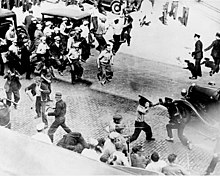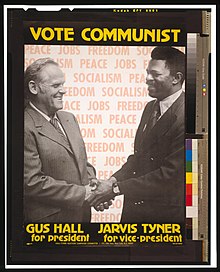Gus Hall
After his release, Hall led the CPUSA for over 40 years, generally taking an orthodox Marxist–Leninist stance and becoming a perennial candidate for president of the United States.
[2][3] Hall's parents were Finnish immigrants from the Finland, Lapua region, and were politically radical: they were involved in the Industrial Workers of the World (IWW) and were early members of the Communist Party USA (CPUSA) in 1919.
[5] According to Hall, after his father was banned from working in the mines for joining an IWW strike, the family grew up in near-starvation in a log cabin built by Halberg.
[7] At 15, to support the impoverished ten-child family, Hall left school and went to work in the North Woods lumber camps, mines and railroads.
[5] In 1931, an apprenticeship in the YCL qualified Hall to travel to the Soviet Union to study for two years at the International Lenin School in Moscow.
[11] Philip Murray, USWA founding president, once commented that Hall's leadership of the strike in Warren and Youngstown was a model of effective grassroots organizing.
[2] During the first years of the war in Europe, the CPUSA held an isolationist stance, as the Soviet Union and Nazi Germany were cooperating based on the Molotov–Ribbentrop Pact.
When Hitler broke the treaty by invading the USSR in June 1941, the CPUSA began to officially support the war effort.
[4] He began to travel around the United States, ostensibly on vacation but gathering support to replace Dennis as the general secretary.
[4] The McCarthy era had taken a heavy toll on the Communist Party USA, as many American members were called to testify to congressional committees.
[12] In the United States, the rise of the New Left and the Warsaw Pact invasion of Czechoslovakia in 1968 created hostility between leftists and the CPUSA, marginalizing it.
[4] He led the struggle to reclaim the legality of the Communist Party and addressed tens of thousands in Oregon,[15] Washington, and California.
He remained a prolific writer on current events, producing a great number of articles and pamphlets, of which many were published in the magazine Political Affairs.
[5] He also dismissed the radical new revolutionary movements that criticized the official Soviet party line of "Peaceful coexistence" and called for a world revolution.
[22] The writer and J. Edgar Hoover biographer Curt Gentry has noted that a similar story about Hall was planted in the media through the FBI's secret COINTELPRO campaign of disruption and disinformation against radical opposition groups.
[23] In the 1964 United States presidential election, Hall's party supported Lyndon B. Johnson, saying it was necessary to prevent the victory of the conservative Barry Goldwater.
In a press conference that year, Hall warned of witch hunts and McCarthyism in Russia, comparing that country unfavorably with North Korea.
[12] Hall led a faction of the party that stood against Glasnost and Perestroika and, for the hardliners of the CPSU, accused Mikhail Gorbachev and Boris Yeltsin of "demolishing" socialism.
[33] In late 1991, members wanting reform founded the Committees of Correspondence for Democracy and Socialism, a group critical of the direction in which Hall was taking the party.
[34] When they were unable to influence the leadership, they left the party and Hall purged them from the membership, including such leaders as Angela Davis and Charlene Mitchell.
[35] In 1994, Michael Myerson, who had left the CPUSA along with Herbert Aptheker, Angela Davis, Gil Green, and Charlene Mitchell,[36] accused Hall of living a "good bourgeois life" including "an estate in fashionable Hampton Bays.
[41] Many conservatives saw Hall as a threat to the United States, with J. Edgar Hoover describing him as "a powerful, deceitful, dangerous foe of Americanism.
"[12] An inflammatory anti-Christian statement was falsely ascribed to Hall, earning him the hostility of some Christian groups, including Jerry Falwell's Moral Majority.
Slit the throats of their children [and] draw them over the mourner's bench and the pulpit and allow them to drown in their own blood, and then see whether they enjoy singing those hymns."
[43] Hall would later make positive comments about Christianity; in 1963, he called the papal encyclical Pacem in terris "the work of a great Pope".
Nevertheless, some CPUSA members attempted to appeal to the youth, with Gil Green arguing that “the correct line should have been to try to turn this upheaval amongst young people into a permanent kind of movement while letting its dynamics work itself out with our participation.”[47] Despite the fact that the Communist party of Mexico and some Afro-American communists such as Jarvis Tyner and Kendra Alexander opposed homophobia, CPUSA was opposed to gay rights, with the official party programme from early 1970s condemning any behaviour “which encourages or promotes homosexual relationships as an alternative to sound, healthy, male–female relationships or distracts from the family as the basic unity of society and the fundamental component of the future we see to bring into being” and repudiating “as false any attempt to depict the so-called gay lifestyle as part of advanced and even revolutionary movements, or to promote it in the guise of a progressive ideology".
[48] Hall had also intervened on behalf of Bernard Koten, a party member who was arrested in Kiev in August 1963 and charged with homosexuality.


